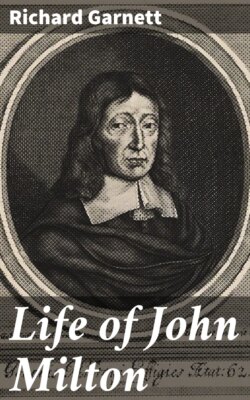Читать книгу Life of John Milton - Richard Garnett - Страница 5
На сайте Литреса книга снята с продажи.
Оглавление"I argue not
Against Heaven's hand or will, nor bate a jot
Of heart or hope; but still bear up and steer
Right onward."
There is something very fine in the steady resolution with which, after so fully admitting to himself that his promise is yet unfulfilled, and that appearances are against him, he recurs to his purpose, frankly owning the while that the gift he craves is Heaven's, and his only the application. He had received a lesson against over-confidence in the failure of his solitary effort up to this time to achieve a work on a large scale. To the eighth and last stanza of his poem, "The Passion of Christ," is appended the note: "This subject the author finding to be above the years he had when he wrote it, and nothing satisfied with what was begun, left it unfinished." It nevertheless begins nobly, but soon deviates into conceits, bespeaking a fatigued imagination. The "Hymn on the Nativity," on the other hand, begins with two stanzas of far-fetched prettiness, and goes on ringing and thundering through strophes of ever-increasing grandeur, until the sweetness of Virgin and Child seem in danger of being swallowed up in the glory of Christianity; when suddenly, by an exquisite turn, the poet sinks back into his original key, and finally harmonizes his strain by the divine repose of concluding picture worthy of Correggio:—
"But see, the Virgin blest
Hath laid the Babe to rest;
Time is our tedious song should here have ending;
Heaven's youngest-teemed star
Hath fixed her polished car,
Her sleeping Lord with handmaid lamp attending;
And all about the courtly stable
Bright harnessed Angels sit in order serviceable."
In some degree this magnificent composition loses force in our day from its discordance with modern sentiment. We look upon religions as members of the same family, and are more interested in their resemblances than their antagonisms. Moloch and Dagon themselves appear no longer as incarnate fiends, but as the spiritual counterparts of antediluvian monsters; and Milton's treatment of the Olympian deities jars upon us who remember his obligations to them. If the most Hebrew of modern poets, he still owed more to Greece than to Palestine. How living a thing Greek mythology was to him from his earliest years appears from his college vacation exercise of 1628, where there are lines which, if one did not know to be Milton's, one would declare to be Keats's. Among his other compositions by the time of his quitting Cambridge are to be named the superb verses, "At a Solemn Music," perhaps the most perfect expression of his ideal of song; the pretty but over fanciful lines, "On a fair Infant dying of a cough;" and the famous panegyric of Shakespeare, a fancy made impressive by dignity and sonority of utterance.
With such earnest of a true vocation, Milton betook himself to retirement at Horton, a village between Colnbrook and Datchet, in the south-eastern corner of Buckinghamshire, county of nightingales, where his father had settled himself on his retirement from business. This retreat of the elder Milton may be supposed to have taken place in 1632, for in that year he took his clerk into partnership, probably devolving the larger part of the business upon him. But it may have been earlier, for in 1626 Milton tells Diodati—
"Nos quoque lucus habet vicina consitus ulmo,
Atque suburbani nobilis umbra loci."
And in a college declamation, which cannot have been later than 1632, he "calls to witness the groves and rivers, and the beloved village elms, under which in the last past summer I remember having had supreme delight with the Muses, when I too, among rural scenes and remote forests, seemed as if I could have grown and vegetated through a hidden eternity."
